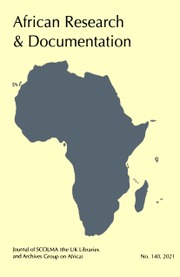No CrossRef data available.
Article contents
The Study of African Languages in the United Kingdom: Part III, and Proposals for a London School of Languages and Literatures
Published online by Cambridge University Press: 25 April 2022
Extract
The first and second parts of this paper have charted the rise and decline of a specialised area of language study, concentrated in a single institution in the United Kingdom. This final part relates that decline to shifts in thebalance and direction of the School of Oriental and African Studies (SOAS), and proposes that consideration be given to the establishment of an intercollegiate ‘School of Languages and Literatures’ within the University of London.
A national debate on The Development of a Strategy for Higher Education into the 1990's was initiated in November 1983 by the University Grants. Committee (UGC), after an exchange of correspondence with the Secretary of State for Education and Science.
- Type
- Articles
- Information
- Copyright
- Copyright © International African Institute 1984
References
Notes
1. Circular letter 16/83 to all Vice-Chancellors and Principals from the Chairman, UGC, 1st November 1983 (including copy of letter from the Secretary of State dated 1st September 1983).
2. Addressed to Vice-Chancellor, University of London, 1st March 1984.
3. See Part I of this paper.
4. Including all paid academic appointments, permanent and temporary, at all levels (but excluding library staff).
5. Figures are approximate, in view of a slight difference in the calculation of full-time and part-time totals before and after 1975. There has been a rise in part-time registrations of postgraduates over the period under review, although this does not substantially affect the general trend.
6. Quoted in ‘The Director's Survey’, Report of the Governing Body and Statement of Accounts for the Session 1965-66, SOAS [1967], p.l.
7. ‘The Director's Survey’, Report of the Governing Body and Statement of Accounts for the Session 1972-73, SOAS [ 1974], p.5.
8. See ‘The Director's Survey’, Report of the Governing Body and Statement of Accounts for the Session 1973-74, SOAS [1975], pp.5-6.
9. ‘generous’ is perhaps a misnomer, since the staff and library resources needed by such students were already paid for, and were less intensively employed in their absence.
10. Intercollegiate students at SOAS (registered at other institutions) have not been included in the above figures: although negligible in the case of Asian and African languages, they are considerable in the case of Linguistics (over 100 in each of the sessions 1982-3 and 1983-4).
11. See Part II of this paper; cf. also the opportunities, within the Licence en langues et linguistique at the Universite libre de Bruxelles, for combining the study of European languages with an introduction to an Asian or African language.
12. House of Commons, 3rd Report of the Foreign Affairs Committee, session 1979/80: Overseas students, fees: aid and development implications, HMSO, 1980, HC 553, para.32.
13. ‘The Director's Survey’, Report of the Governing Body and Statement of Accounts for the Session 1972-73, SO AS [1974],p.6.
14. Cf. the circular letter, dated 8th February 1984, from the Chairman of the recently, established Working party on the Academic Organisation of the School: ‘It [his own Working party] has begun its work by asking whether the present academic organisation of the School is the most appropriate structure within which (a) to fulfill the policies adopted as the result of the Working party on Longer-term development and (b) to promote the research and other activities of the School’.
15. See Part II of this paper.
16. Cf. the list of languages covered by the Department of Africa in 1965, in Part I of this paper.
17. Possible reforms in internal organisation are currently under consideration by the Working party on the Academic Organisation of the School.
18. Luxembourg, June 1984.
19. Cf. the statement of policy contained in the letter of 1st September 1983, from the Secretary of State for Education and Science to the Chairman, UGC.
20. Although the ‘language and culture’ departments at SOAS (with the exception of the Department of the Hear and Middle East) have hitherto been relatively little involved in intercollegiate teaching, the possibilities in this direction have been exploited with success by disciplinary departments, including Phonetics and Linguistics, and History (the latter having taken a major role in the recent development of intercollegiate and interdisciplinary Religious Studies teaching in London).




